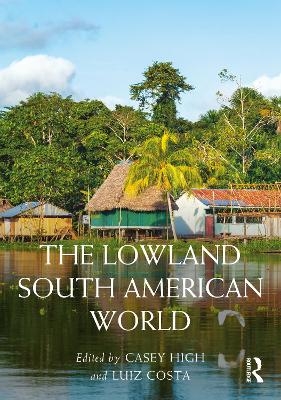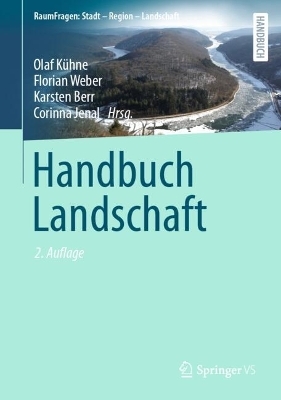
The Lowland South American World
Routledge (Verlag)
978-0-367-40630-1 (ISBN)
- Noch nicht erschienen (ca. November 2024)
- Versandkostenfrei innerhalb Deutschlands
- Auch auf Rechnung
- Verfügbarkeit in der Filiale vor Ort prüfen
- Artikel merken
The Lowland South American World showcases cutting-edge research on the anthropology of Lowland South America, providing both an in-depth knowledge of Lowland South American life ways and engaging readers in urgent social, environmental and political issues in the contemporary world.
Covering the vast expanse of a region that includes all of South America except for the Andes, its forty chapters engage with questions of what ‘Lowland South America’ means as a geographical designation, both in studies of indigenous Amazonian peoples and other lowland areas of the continent. They emphasize the multiple ways that the practices and cosmologies challenge conventional Western ideas about nature, culture, personhood, sociality, community, and indigenous people.
Some of the region’s well-known contributions to anthropology, such as animism, perspectivism, and novel approaches to the body are updated here with new ethnography and in light of the varying political situations in which the region’s peoples find themselves. With contributions by authors from fifteen different countries, including a number of Indigenous anthropologists and activists, this book will set the agenda for future research in the continent.
The World of Lowland South America is a valuable resource for scholars and students of anthropology, Latin American studies and indigenous studies, as well history, geography and other social sciences.
Casey High is a Senior Lecturer in Social Anthropology at the University of Edinburgh. His research with Waorani communities Ecuador over the past 25 years has focused on memory, language, collaborative anthropology, and Amazonian environmental activism in response to oil development. Luiz Costa is Associate Professor of Anthropology at the Institute of Philosophy and Social Sciences of the Federal University of Rio de Janeiro, and a member of the Graduate Programme in Social Anthropology at the National Museum. He has carried out research with the Kanamari of southwestern Amazonia since 2002.
Introduction Part 1: Colonial Legacies, Indigenous Histories 1. The Enigma of Ashaninka Endowarfare: Cultural Dictate or Historical Product? 2. Labor, Resistance, and Politics: Indigenous Agency in the Bolivian Rubber Boom 3. Christianity and Christians in Amazonia 4. Guianese Maroons in an Amazonian Ethnological Landscape Part 2: Myth, Memory and Storytelling 5. The Origin Myth of a Myth: The ‘Land without Evil’ Revisited 6. A Matrix of Knowledge: Indigenous Histories and Indigenous Anthropology in Brazil 7. The Work of Desire: Alterity and Exogamy in a Kotiria Origin Myth from the Northwest Amazon 8. Storytelling, Textuality and Experience in Lowland South America 9. Eras and Events: Contrasting Amazonian Narratives of the Past Part 3: The Substance of Life: Making Real People 10. Birth in Amazonia: Transforming Responsibility in the Care Encounter 11. Detachable Persons, Porous Bodies, and the Art of Love in the Argentinian Chaco 12. The Imports of Uncertainty in the Tragedy of a Man of Substance 13. A World More Bearable in Which to Live: Three Ethnographic Examples from Lowland South America 14. The ways of food and feathers: Revisiting the Bororo Literature Part 4: Land, Territory and Mobility 15. Darawate: Native Amazonian Trail Signals and other Ephemeral Plant Scripts 16. Regenerating Life: Indigenous Landscapes on the Atlantic Coast of Northeast Brazil 17 Language and Territory in Mapuche Ritual Practices in Chile (Zugun ka mapu mapuche gijañmawün mew Gülu püle) 18. Paths and Networks Beyond the Human in Amazonian Social Worlds 19. Amazonian Environmental Activism at COP26: A Conversation with Uboye Gaba Part 5: Ownership, Mastery and Exchange 20. Child, Pet, and Prey: Relations of Dependence in Amazonia 21. Mastery Without Servitude: On Freedom and Dependence in Amazonia 22. A Politics of Regard: Action and Influence in Lowland South America 23. Pets and Domesticated Animals in Lowland South America Part 6: Gender, the Body, and the Senses 24. Darséa Bhasera Numia: Tukana Women, Kumua Women, and their Transformation 25. Neither Witches nor Charlatans: Subverting Stereotypes of Shipibo-Konibo Female Shamans in Western Amazonia 26. Sick of School: Childhood, Gender, and Intergenerational Change in Guyana Part 7: Imagery, Materiality and the Visual 27. Indigenous Media as Cultural Outreach: Contextualizing a Longstanding A’uwe (Xavante) Tradition 28. The Metaphysics of An Amazonian Tubology 29. “Assembling” the Xingu Indigenous Territory: A Kawaiwete Shaman and His Collection of Material Culture 30. Collecting Amazonia: Beyond Material Culture and Ethnological Museums Part 8: Language, Music, and Ritual Communication 31. Voices of the Spirits: Ritual Discourse, Musicality, and Communicative Ideologies in Amazonia 32. Geomythology of Musicological Rites: A Journey with Wild Dialogue 33. Indigenous Language Revival as a Practice of Resistance: The Case of Patxohã Language and Pataxó People in Northeast Brazil 34. Kuambü: The Poetics and Politics of a Xingu Ritual in Brazil Part 9: Indigenous Politics and Leadership 35. Voting in Lowland South America: Changing Relations Between Indigenous People and Nation-States 36. Beauty and Strength: Mẽbêngôkre-Kayapó Women’s Leadership and Governance in Brazil 37. Cultural Duality in Amazonian Ecuador: The Canelos Quichua Part 10: Education, Inequality and the State 38. The Sociocultural Dimensions of Education among River-Dwellers and Other Lowland Communities in Brazil 39. Water, Water Everywhere: Health and Sanitation in Indigenous Communities of the Amazon 40. Indigenous Agency, Isolation and Access to Justice
| Erscheint lt. Verlag | 25.11.2024 |
|---|---|
| Reihe/Serie | Routledge Worlds |
| Zusatzinfo | 2 Tables, black and white; 47 Halftones, black and white; 47 Illustrations, black and white |
| Verlagsort | London |
| Sprache | englisch |
| Maße | 174 x 246 mm |
| Themenwelt | Naturwissenschaften ► Geowissenschaften ► Geografie / Kartografie |
| Sozialwissenschaften ► Ethnologie | |
| Sozialwissenschaften ► Soziologie ► Spezielle Soziologien | |
| ISBN-10 | 0-367-40630-6 / 0367406306 |
| ISBN-13 | 978-0-367-40630-1 / 9780367406301 |
| Zustand | Neuware |
| Haben Sie eine Frage zum Produkt? |
aus dem Bereich


